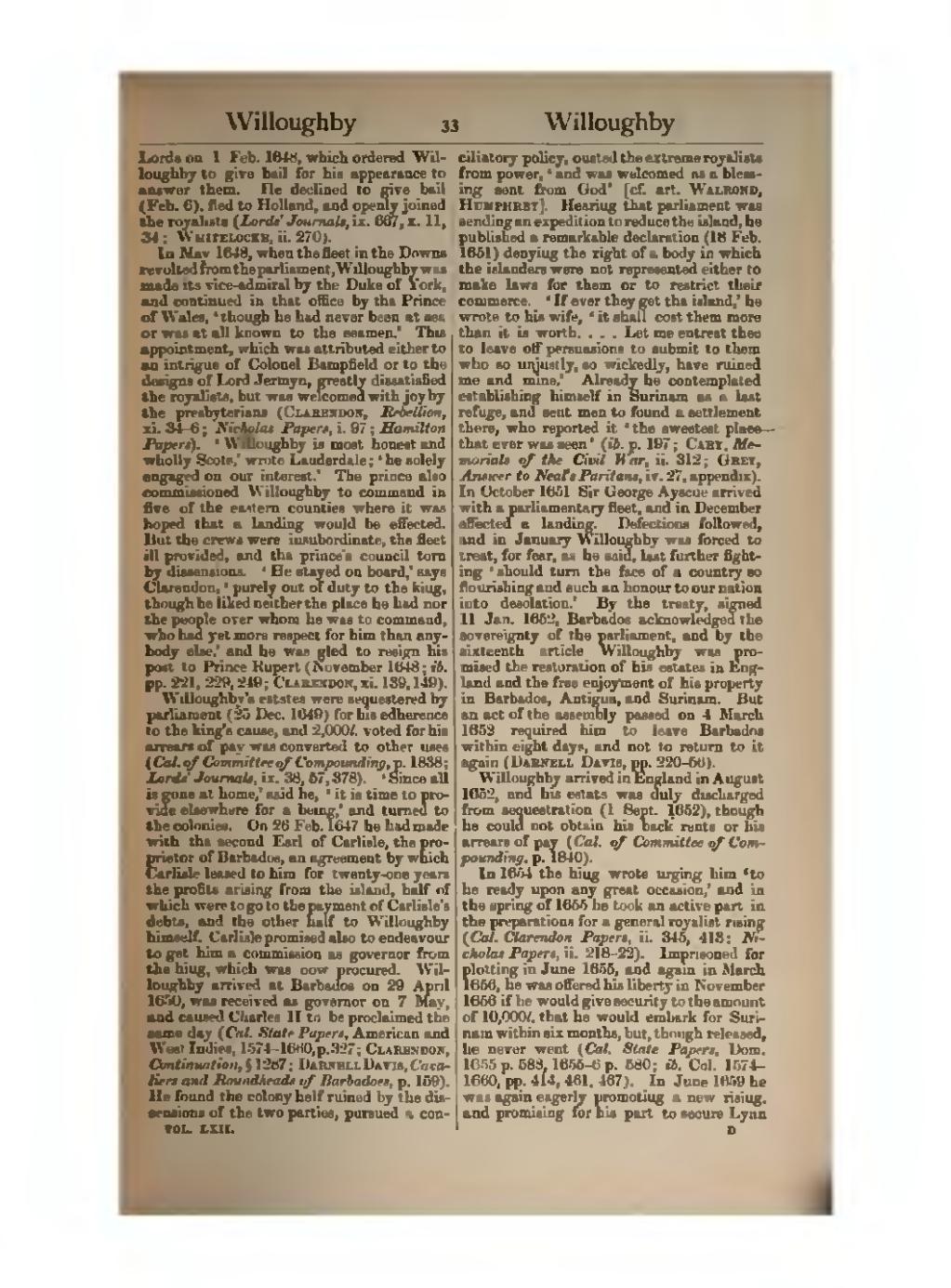Lords on 1 Feb. 1648, which ordered Willoughby to give bail for his appearance to answer them. He declined to give bail (Feb. 6), fled to Holland, and openly joined the royalists (Lords' Journals, ix. 667, x. 11, 34; Whitelocke, ii. 270).
In May 1648, when the fleet in the Downs revolted from the parliament, Willoughby was made its vice-admiral by the Duke of York, and continued in that office by the Prince of Wales, ‘though he had never been at sea or was at all known to the seamen.’ This appointment, which was attributed either to an intrigue of Colonel Bampfield or to the designs of Lord Jermyn, greatly dissatisfied the royalists, but was welcomed with joy by the presbyterians (Clarendon, Rebellion, xi. 34–6; Nicholas Papers, i. 97; Hamilton Papers). ‘Willoughby is most honest and wholly Scots,’ wrote Lauderdale; ‘he solely engaged on our interest.’ The prince also commissioned Willoughby to command in five of the eastern counties where it was hoped that a landing would be effected. But the crews were insubordinate, the fleet ill provided, and the prince's council torn by dissensions. ‘He stayed on board,’ says Clarendon, ‘purely out of duty to the king, though he liked neither the place he had nor the people over whom he was to command, who had yet more respect for him than anybody else,’ and he was glad to resign his post to Prince Rupert (November 1648; ib. pp. 221, 229, 249; Clarendon, xi. 139, 149).
Willoughby's estates were sequestered by parliament (25 Dec. 1649) for his adherence to the king's cause, and 2,000l. voted for his arrears of pay was converted to other uses (Cal. of Committee of Compounding, p. 1838; Lords' Journals, ix. 38, 57, 378). ‘Since all is gone at home,’ said he, ‘it is time to provide elsewhere for a being,’ and turned to the colonies. On 26 Feb. 1647 he had made with the second Earl of Carlisle, the proprietor of Barbados, an agreement by which Carlisle leased to him for twenty-one years the profits arising from the island, half of which were to go to the payment of Carlisle's debts, and the other half to Willoughby himself. Carlisle promised also to endeavour to get him a commission as governor from the king, which was now procured. Willoughby arrived at Barbados on 29 April 1650, was received as governor on 7 May, and caused Charles II to be proclaimed the same day (Cal. State Papers, American and West Indies, 1574–1660, p. 327; Clarendon, Continuation, § 1287; Darnell Davis, Cavaliers and Roundheads of Barbadoes, p. 159). He found the colony half ruined by the dissensions of the two parties, pursued a conciliatory policy, ousted the extreme royalists from power, ‘and was welcomed as a blessing sent from God’ [cf. art. Walrond, Humphrey]. Hearing that parliament was sending an expedition to reduce the island, he published a remarkable declaration (18 Feb. 1651) denying the right of a body in which the islanders were not represented either to make laws for them or to restrict their commerce. ‘If ever they get the island,’ he wrote to his wife, ‘it shall cost them more than it is worth. … Let me entreat thee to leave off persuasions to submit to them who so unjustly, so wickedly, have ruined me and mine.’ Already he contemplated establishing himself in Surinam as a last refuge, and sent men to found a settlement there, who reported it ‘the sweetest place that ever was seen’ (ib. p. 197; Cary, Memorials of the Civil War, ii. 312; Grey, Answer to Neal's Puritans, iv. 27, appendix). In October 1651 Sir George Ayscue arrived with a parliamentary fleet, and in December effected a landing. Defections followed, and in January Willoughby was forced to treat, for fear, as he said, lest further fighting ‘should turn the face of a country so flourishing and such an honour to our nation into desolation.’ By the treaty, signed 11 Jan. 1652, Barbados acknowledged the sovereignty of the parliament, and by the sixteenth article Willoughby was promised the restoration of his estates in England and the free enjoyment of his property in Barbados, Antigua, and Surinam. But an act of the assembly passed on 4 March 1652 required him to leave Barbados within eight days, and not to return to it again (Darnell Davis, pp. 220–56).
Willoughby arrived in England in August 1652, and his estate was duly discharged from sequestration (1 Sept. 1652), though he could not obtain his back rents or his arrears of pay (Cal. of Committee of Compounding, p. 1840).
In 1654 the king wrote urging him ‘to be ready upon any great occasion,’ and in the spring of 1655 he took an active part in the preparations for a general royalist rising (Cal. Clarendon Papers, ii. 345, 413; Nicholas Papers, ii. 218–22). Imprisoned for plotting in June 1655, and again in March 1656, he was offered his liberty in November 1656 if he would give security to the amount of 10,000l. that he would embark for Surinam within six months, but, though released, he never went (Cal. State Papers, Dom. 1655 p. 588, 1655–6 p. 580; ib. Col. 1574–1660, pp. 414, 461, 467). In June 1659 he was again eagerly promoting a new rising, and promising for his part to secure Lynn
